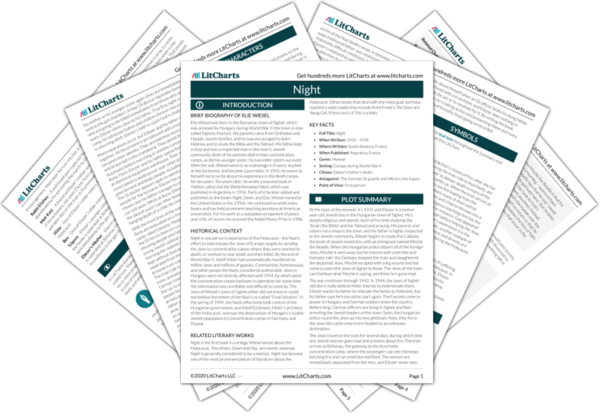Having and Losing Faith in God
One of the main themes of Night is Eliezer's loss of religious faith. Throughout the book, Eliezer witnesses and experiences things that he cannot reconcile with the idea of a just and all-knowing God.
At the beginning of the narrative, Eliezer declares, "I believed profoundly." He is twelve years old and his life is centered around Judaism—studying the Talmud during the day, praying at the synagogue at night until he weeps with religious feeling. He…
read analysis of Having and Losing Faith in GodInhumanity
One of the legacies of the Holocaust is the sheer scale of one group of people's inhumanity towards other groups of people. In the case of the Jews, the German government and German society attempted to redefine them as sub-human, and then as creatures who deserved to die.
But Night doesn't just focus on the Nazis and their seemingly endless diabolical behavior (concentration camp doctors—those who swear an oath to do no harm—are some of…
read analysis of InhumanityFathers and Sons
As his family is being marched from its home, Eliezer sees his father weep for the first time. By the end of the book, his father is dead, another victim of the Nazi death camps. In between, Night explores the ways traditional father-son relationships break down under impossibly difficult conditions. At the heart of this theme is Eliezer's relationship with his own father. Yet the narrator also pays attention to other father-son relationships among the…
read analysis of Fathers and Sons
Guilt and Inaction
On several occasions in Night, Eliezer watches as his father is beaten and can do nothing about it. Or, rather, he could perhaps help his father in the very short term, but he would quickly pay for it with his life. (Eliezer's father, too, must watch powerlessly as Eliezer is whipped by a kapo.) Even though a small act of resistance is the equivalent of suicide, Eliezer cannot help feeling guilt about his fear…
read analysis of Guilt and Inaction






